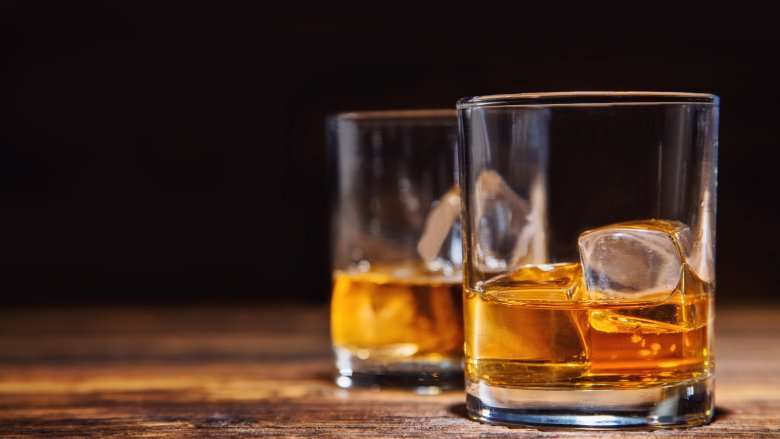The Real Reason Whiskey Is Healthier Than Any Other Drink
There's no denying that the perfect way to end any day — good or bad — is with a delicious, boozy beverage. There's also no denying that many of these carb-heavy, calorie-laden, sugar-filled drinks aren't great for your waistline, and naysayers might be lining up to tell you just how bad your end-of-day drink is. But choose wisely — and choose whiskey — and you'll find you can pour yourself an almost surprisingly good-for-you drink after all.
Red wine gets all the positive press when it comes to an alcoholic drink with health benefits, but scientific research shows that it's actually the bottle of whiskey you should be reaching for — and here's why.
Back in ye olde times, whiskey was once used for medicinal purposes. It was often found being passed around the battlefields in the bloody aftermath, and it was frequently used as an antiseptic. It's something you see in movies, sure, but a study published in the Annals of Microbiology gave complete credence to the practice.
The study looked at just how many different types of bacteria could survive in the ice found at a bar or restaurant, and let's just say that it's not great news. There were 31 different species of bacteria found, including the kind that causes staph infections. Researchers then measured their resistance to different types of alcohol, including whiskey and vodka, as well as different types of mixers and different environmental conditions.
Bacteria continued to thrive and swim and do whatever it is bacteria do in all the samples except one: the whiskey. The whiskey was the only drink to get rid of all different types of bacteria, and here's the creepy thing: the American Council on Science and Health says that this wasn't any ordinary ice all this bacteria was found it. It was what's called "food grade ice", which is absolutely the stuff you're getting in bars and restaurants across the country.
Should you take a flask of whiskey with you whenever you go out? Should you only order whiskey from restaurants and bars? We're not here to tell you how to live your life.
But we will tell you that there are some other fascinating studies on the benefits of whiskey, too. In September 2018, Britain's Grace Jones turned 112 years old. NPR spoke to this oldest woman in Britain — known to her friends as Amazing Grace — and asked her just what she attributed to her long life. Her answer? Her decades-long practice of having a glass of single malt whiskey every night before bed. It sounds too good to be true, right? It might not be.
A slew of scientific research (via Town and Country) has found whiskey has some fascinating properties. Take the high concentration of ellagic acid. Those are the antioxidants that help your body destroy rogue cells, and in other words, it helps fight a ton of different diseases. It's the same thing that's in wine, and whiskey has as much of more of these little warriors. (Single malt has been found to have the highest amount of antioxidants.)
And speaking of antioxidants, let's take a look at the age-old belief that a hot toddy is exactly what the doctor ordered when you're suffering from a cold. The drink — traditionally made with hot water, whiskey, honey, and lemon — has been a cure-all for a long time. So, which is it — medicine or old wives' tale?
According to Dr. William Schaffner, chair of preventative medicine at Vanderbilt University (via Boston 25 News), it's pretty much medicine. Well, mostly. While it's not going to cure your cold, it is going to make your symptoms lessen considerably. The hot water will help clear congestion, the honey is going to help soothe your sore throat, and the whiskey is going to work to dilate blood vessels, relieve that swollen feeling, and encourage your immune system to deal with the infection. A hot toddy just before bed might also help you fall asleep faster — and sleep is the real hero here.
Oddly enough, all this scientific research is just verifying what our ancestors already knew, says the Scotsman. This traditional drink of Ireland and Britain was originally given the name Uisge Beatha, which translates to Water of Life, and a 16th century treatise by a historian named Raphael Holinshed shows just how valued whiskey was as a cure-all. He writes:
"Being moderately taken, it slows the age, cuts phlegm, helps digestion, cures the dropsy, it heals the strangulation, keeps and preserves the head form whirling, the tongue from lisping, the stomach from womblying, the guts from rumbling, the hands from shivering, the bones from aching... and it truly is a sovereign liquor if it be orderly taken."
You can't get more of a glowing recommendation than that, can you? Now that science is starting to back up all the glowing recommendations whiskey has been given over the years and it's becoming clear that there's more to whiskey than meets the eye, you have all the reasons you need to give keep a few bottles for more than just special occasions.
